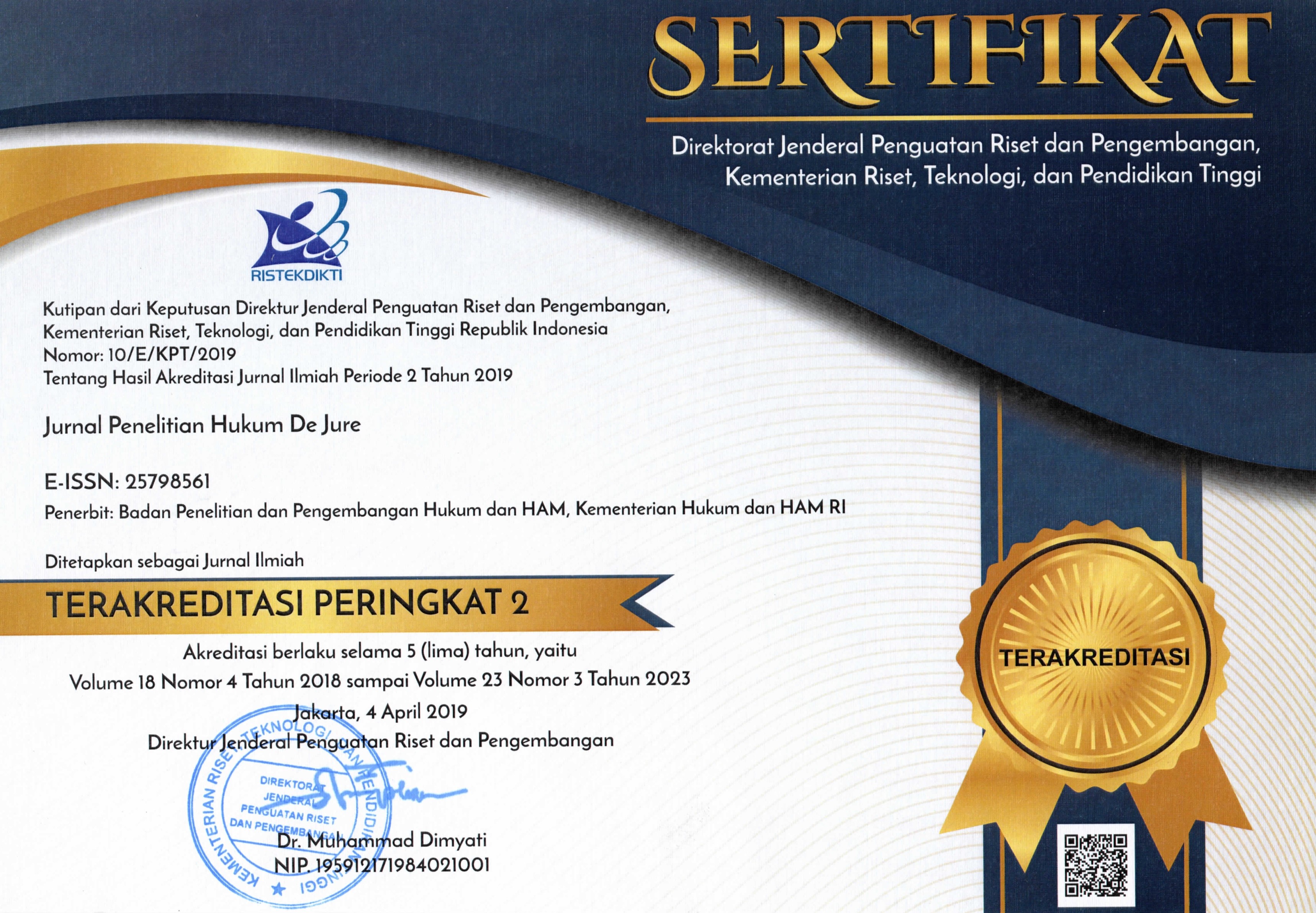The Power of Pacta Sunt Servanda Principle in Arbitration Agreement
Abstract
Pacta sunt servanda is a legal principle that applies universally. With this principle, everyone is expected to carry out an agreement made with other parties voluntarily. To enforce the principle by the court in case of dispute in the implementation of the agreement, it requires conditions that must be met. In the context of an arbitration agreement, it must also meet specific rules stipulated in the Arbitration Law. In practice, there is still disobedience to this principle where the parties who have been bound by an arbitration agreement are still taking the litigation in solving their case. In this research, the problems examined are how the principle of pacta sunt servanda is regulated in the arbitration law and how strong this principle is applied. The method used in this research is normative juridical. Based on the research, it is concluded that the implementation of the pacta sunt servanda principle is regulated in several articles of the Arbitration Law. The pacta sunt servanda principle is not valid absolutely because it is deviated by other laws or legal principles. It is recommended that parties in an agreement shall understand the choice of dispute settlement well including the consequences of such choice.
Keywords
Full Text:
PDFReferences
Bond, Stephen R. Dalam Erman Rajagukguk, Arbitrase Dalam Putusan
Pengadilan. Jakarta: Chandra Pratama, 2000.
Donald, Henry. “Penyelesaian Sengketa Hak Kekayaan Intelektual Melalui Acara Cepat.” Jurnal Penelitian Hukum De Jure 17, no. 1 (2017).
Fuady, Munir. Arbitrase Nasional (Alternatif Penyelesaian Sengketa Bisnis). Bandung: PT Citra Aditya Bakti, 2000.
Habibah, Siti Maizul, Oksiana Jatiningsih, and Iman Pasu Marganda Hadiarto Purba. “Jaminan Hak Asasi Manusia Bagi Pekerja Rumah Tangga Melalui Perjanjian Kerja Di Surabaya.” Jurnal HAM 12, no. 2 (2021).
Kbbi.web.id. “Www.Kbbi.Web.Id.” Kbbi.Web.Id.
Melani, Agustina. “Babak Baru Kepemilikan TPI.” Liputan6.Com.
Perebutan Memi, Cut. “Penyelesaian Sengketa Kompetensi Absolut Antara Arbitrase Dan Pengadilan.” Jurnal Yudisial 10, no. 2 (2017).
Muhtarom, M. Asas Asas Hukum Perjanjian Suatu Landasan Pembuatan Kontrak. Publikasi Ilmiah Universitas Muhammadiyah
Surakarta. Vol. 1. Jakarta: SUHUF, 2014.
Nugroho, Susanti Adi. Penyelesaian Sengketa Arbitrase Dan
Penerapan Hukumnya. Jakarta: Kencana, 2017.
Pujiyono. “Kewenangan Absolut Lembaga Arbitrase". Jurnal Recthsvinding 7, no. 2 (2018).
Republik Indonesia. Undang- Undang Nomor 30 Tahun 1999 Tentang Arbitrase Dan Alternatif Penyeleasaian Sengketa, n.d. Situmorang, Mosgan. “Pelaksanaan Putusan Arbitrase Nasional Di Indonesia.” Jurnal Penelitian Hukum De Jure 17, no. 4 (2017).
———. “Pembatalan Putusan Arbitrase.” Jurnal Penelitian Hukum De Jure 20, no. 4 (2020).
Soekanto, Soerjono, and Sri Mamudji. Penelitian Hukum Normatif Suatu Tinjauan Singkat. Jakarta: Raja Grafindo Persada, 2013.
Subekti, and R Tjitrosudibio. Kitab Undang- Undang Hukum Perdata (KUH Perdata). Jakarta: Pradnya Paramita, 1996.
thelawdictionary.com. “Www.Thelawdictionary.
Com.”wikipedia.id". Aust, Anthony, Modern Treaty Law and Practice.Wikipedia.
Yahya Harahap dalam Disriani. “Perjanjian Arbitrase Dan
Kompetensi Absolut Arbitrase,.” 2021.
Article Metric
Abstract this article has been read : 1319 timesPDF file viewed/downloaded : 1795 times
DOI: http://dx.doi.org/10.30641/dejure.2021.V21.447-458
Refbacks
- There are currently no refbacks.
Copyright (c) 2021 Mosgan Situmorang

This work is licensed under a Creative Commons Attribution-NoDerivatives 4.0 International License.
Jurnal Penelitian Hukum De Jure Indexed by :











